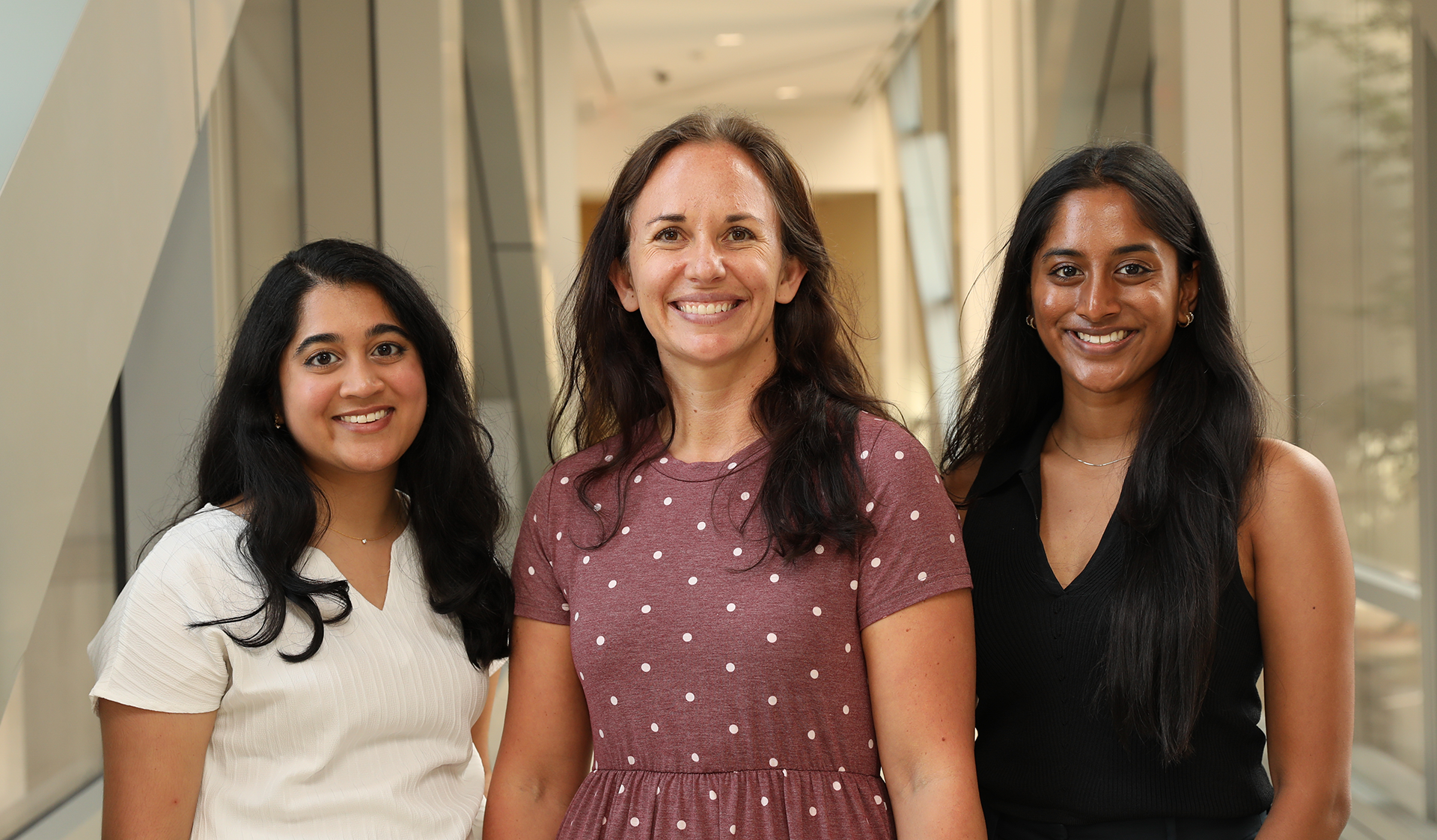Treating the whole patient
Through the Trauma Survivors Network at VCU Health, medical student volunteers help patients recover from injuries both physically and mentally.

M2s Sriya Kongala (left) and Shivani Mullapudi (right), pictured with Kira Shifflett, VCU Medical Center’s trauma outreach coordinator, volunteer with the Trauma Survivors Network to help patients mentally recover after a physical injury. (Photo by Arda Athman)
Surviving a physical injury relies heavily on the skills of medical professionals like the highly orchestrated teams of trauma specialists at VCU Medical Center. A patient’s long-term mental and emotional recovery, which can be just as complex, depends on the support systems in place during and after treatment. That's where the Trauma Survivors Network comes in.
Facilitated by the American Trauma Society (ATS), the Trauma Survivors Network (TSN) is a program that partners with medical centers nationwide to provide information, support and community for trauma survivors and their families. VCU has been a TSN site for nearly 10 years, and preclinical medical students are on the front line as volunteers.
“Trauma is an innately human experience," said Shivani Mullapudi, a second-year medical student and volunteer with the TSN. “You can prepare as much as you want by looking at a patient’s chart, but really, it takes entering their room and sitting down and speaking with them, seeing them wincing in pain, a tear falling down their cheek, or the faces and body language of their family members, if they have any, sitting at their bedside.”
'We help them find a new normal’
VCU Medical Center is the only comprehensive Level I trauma center in the region, verified in adult, pediatric and burn trauma care. Board-certified trauma and critical care surgeons are available around the clock, and the team sees more than 4,000 trauma patients, from all over Virginia, every year. Designated by the American College of Surgeons and the American College of Emergency Physicians, Level I trauma centers are required to provide “total care for every aspect of injury,” which includes community outreach to promote prevention and mental health support for those coping in the aftermath of a traumatic injury.
VCU is one of more than 200 TSN sites across the U.S. and Australia. According to Kira Shifflett, RN, the trauma outreach coordinator and TSN coordinator for VCU Medical Center, the effort started around 2008 when the concept of trauma-informed care began gaining traction within medicine.
“It’s part of an effort to treat the whole patient and to help them recover mentally while recovering from a physical injury,” Shifflett said of TSN. “We help them find a new normal, help them cope, help them get back to some sort of sense of belonging within their life in whatever manner that may be.”
Volunteers visit patients to provide TSN handbooks and share information about the hospital and surrounding area like where to stay, park and eat. They also help connect patients with resources like a monthly TSN newsletter, online recovery management courses, peer support groups, chaplain services and Dogs on Call, VCU Health’s dog therapy program.
According to fellow M2 Sriya Kongala, volunteers are also there to listen.
“You might think a volunteer is just someone who brings you tea or coffee, but so many things can be accomplished if you’re willing to just be there for someone and to listen,” Kongala said. “Especially in health care, you’re going to learn so much more and be able to provide a higher level of care if instead of just talking at or explaining things to a patient, you listen to them, too.”
Shifflett, who oversees and schedules the volunteers, noted how crucial medical student involvement is to the program's success. They are “the first point of contact” for patients who need support from the TSN, she said, and the impact often goes beyond simply sharing information.
“It’s great for the patients and it’s great for the medical students. TSN offers students the opportunity to foster the doctor-patient experience in a less intimidating and extremely rewarding way,” Shifflett said. “Sometimes we have patients who don’t have a lot of family or support, and so having someone who doesn’t have an agenda, to draw blood or give meds, that just has 10-15 minutes to go in and talk, really makes a difference.
How to get involved
For more information about volunteering with the Trauma Survivors Network, students can contact the student interest group at tsnrounds@gmail.com.
Other community service opportunities for students are available here.
Send us your stories!
The School of Medicine communications team is always looking to highlight student success, faculty achievement, cutting-edge research and innovative initiatives around the MCV Campus. If you have an idea for a story, please submit your pitch to laura.ingles@vcuhealth.org.

